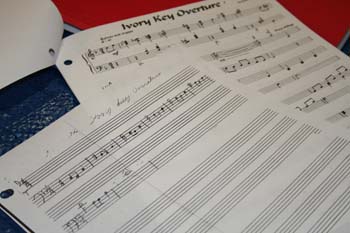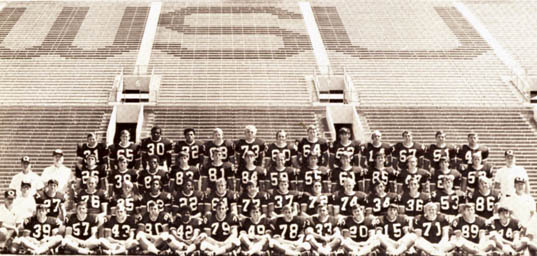
Tragedy's wake can be shot through with poetry, music — and even flourishes of the magical.
Howard and Virginia Johnson's grief over the death of their son, Ronald Gene, staggered them.
A member of Wichita State’s football team in 1970, Ronnie was aboard one of two planes the university chartered to fly players, coaches and a number of Shocker supporters to a game slated for Oct. 3 at Utah State.
The “black” plane made it up and over the Rocky Mountains, landing safely in Logan on Oct. 2. The “gold” plane crashed into a mountainside not far from Silver Plume, Colo., near Loveland Pass, killing Ronnie and 28 others at the site. Another player and the team’s trainer died after receiving medical attention. There were nine survivors.
It was the darkest, saddest day in university history. The nation helped mourn. But for the families and close friends of those who died, it was an almost unbearably bleak time, for a long time. And for Howard and Virginia, their pain was punctuated with what at first glance seems trivial: the loss of a ring.
Act III
This coming Oct. 2, on the 38th anniversary of the crash, Howard and Virginia; their daughter, Vickie Beck ’73/73 and her husband, Scott Beck; Howard and Virginia’s granddaughters, Sara and Heather (who was born, by the way, on Oct. 2, 1976); and tens of other Johnson family members and friends; as well as WSU musical theater patrons plan to be in Wilner Auditorium for the opening night of “Waltzing in Heaven” — a musical written by Howard as a tribute to his son and the others who died in Colorado.
“I was a little trepidatious about this project at first,” says Marie Allyn King, associate professor and director of musical theater and opera programs at WSU. “But I became intrigued. The play covers a subject that means so much in our community. It’s historical — it will resonate here. Howard wrote it as a memorial to Ronnie, but it’s about getting on with life. It’s emotional, yes, but hopeful. There’s humor, and there’s a quiet, humble strength.”
King, who has spent time with Howard and Virginia getting to know them and their life stories, will direct the premier. “For me,” she adds, “it’s a give-back to the community. It’s an honor to be asked to do it.”
James Rhatigan, WSU dean emeritus and a consultant with the WSU Foundation, was the one to originally take Howard’s script to WSU’s performing arts department for consideration. Rhatigan, who was dean of students at the time of the crash, remembers acutely those dark days. Though the play deals with great sadness and loss, he says, it also reflects hope and moving ahead: “It’s a life-affirming play — in a country-and-western setting.”
One aspect of the project that King is especially enthusiastic about is the chance for the department to take on something entirely new. “It’s going to be a great experience to work on new material,” she says. “We’ll be casting in the fall and using local musicians.”
Wichita-based musician Richard Crowson fs ’91 and other members of the Home Rangers, along with fiddler Rob Loren, have signed up. “The band is almost a character in this musical,” Crowson says. “We’ll be onstage throughout most of the play. One of the most exciting parts about this is that it’s never been done before, so we’ll get to do our own interpretation of the music. And the music is the kind we already know and love.”
Two of the musical’s 14 songs were composed by Vickie and Scott Beck, with Rick Lopez, a musician from south Texas, composing the rest. The music ranges from bluegrass to country to polka to, of course, the waltz.
Most of the lyrics are taken directly from poems written by Howard through the years after the crash. In 2001, these poems were printed together as Gramp Pa Pa’s Remembrances. Janie Peak, a theater professor at Park College in Parkville, Mo., is working with him on the story and script.
“Waltzing in Heaven” is 82-year-old Howard Johnson’s first musical.
Act II
“For months after the crash, Howard just shut down,” Virginia says. She and Howard are sitting side by side on the back deck of their home in Kansas City, Mo. It’s a fine spring day.
The Johnsons recall that they were in Tulsa, Okla., for an American International Charolais Association meeting on Oct. 2, 1970. Their 19-year-old daughter was at Wichita State, where she studied nursing and American studies. Howard, a successful Charolais cattleman and breeder before retiring from the business in 1986, is proud to remember that she was chosen that year as Miss Charolais USA Queen. He adds, “I don’t know what we would have done without Vickie Lynn. Her strength at that time still amazes me.”

In the days after Ronnie’s death, Howard and Virginia searched for a silver initial ring Virginia had purchased in Mexico and given her son when he was 14. She gave Howard a matching ring of his own, and the rings came to symbolize the father-son bond. Ronnie, Virginia says, never took off his ring.
But it wasn’t recovered at the crash site and didn’t turn up at the Johnsons’ home or at Ronnie’s dorm room. Howard and Virginia thought the ring was gone forever. Howard tucked his away in a drawer.
The Johnsons did find two items among Ronnie’s things that are particularly dear to them: the opening bars of a composition he had begun called the “Ivory Key Overture” (shown above) and a poem he had written. “Courage Rules the World” contains these lines: Dark clouds have come amidst a vision/But men who’ve failed to fear/Have fought and made the right decision/It’s courage that makes things clear.
“Ronnie wrote that poem for me,” Howard reports.“He knew about some set-backs I was having, and he was trying to help. Did you know he was studying psychology at college? He always tried to help everyone he could. Ronnie never met a stranger.”
Counseling those in need was something that seemed to come naturally to their son, the Johnsons say. At Wichita State, the psychology major tutored underprivileged children and was planning on helping set up a sports club for boys later that year.
Ronnie was, Howard and Virginia report, talented in many ways. He played piano, trumpet, all kinds of sports — but most of all he was simply, they say, “a good person.”
As Howard retreated into himself, he reflected on his growing-up years during the Depression, the family life he and Virginia had built together, their terrible loss. He tried to make sense of life — and he took a cue from his son. He began learning about the cathartic power of words. He began writing his own poetry.
Act I
“Howard has an irreverent sense of humor,” King relates. “He sometimes uses that to mask his deepest feelings.”
Howard’s irreverent, even earthy, comedic bent comes through in a number of his poems and in several passages in his play. In the first act of “Waltzing,” for instance, characters at a ranch community barn party sing and dance their way through the “Who’s Passing Gas Polka” and other light-hearted songs, including “Vegetarian Cowboy,” “I’m a Good Cook” and “Dance with Me, Cowboy.”
The act closes with the announcement of the plane crash and introduces the play’s title song, “Waltzing in Heaven.” The lyrics were written by Howard, and his daughter, who works as a child psychotherapist in Baltimore, Md., composed the music.
Act II, which takes place 13 years after the plane crash, opens with the play’s characters back together for a homecoming. The passage of time is noted in such songs as “Wrinkles on Others.” Key scenes tell Howard and Virginia’s tale of how their son’s ring was returned to them, a story that also is told in Chicken Soup for the Christian Soul as “The Miracle of the Ring.” Or, as the character Mary Lou puts it in “Waltzing”: “It’s absolutely mystical. Wait ’til you hear.”
In 1982, Kathy Ricken was hiking with her husband, an aviation buff, on Mount Trelease near the site of the crash. She stopped to rest and glimpsed something silver glinting in the dirt. It was a ring with the initials RGJ.
She later explained she was spurred to search for the identity of the ring’s owner by a dream she’d had about a young blond boy walking away from her. After researching news coverage of the crash, she determined the ring must have belonged to Ronald Gene Johnson and phoned the Johnsons.
Virginia took the call. “She told me she had been to the crash site and thought she might have found something of ours,” Virginia relates. “I just knew it had to be Ronnie’s ring.”
Ricken personally brought the ring home to Virginia and Howard. Today, he wears his ring and Ronnie’s stacked together as one.
Before the musical ends with Howard and Vickie’s title song, there is a scene that features “Ivory Key Overture,” the piece begun by Ronnie when a young, thoughtful man — writing poetry and music, studying psychology, engaged to be married, playing defensive safety for the Shockers. Rick Lopez has completed the work, threading in themes that were important to Ronnie, including Wichita State’s Alma Mater and fight song. On Oct. 2, 3 and 4 in Wilner Auditorium, a pianist representing Ronnie will play the finished song.
“We have a tape of Ronnie playing the piano. I often listen to it when I’m cleaning house,” Virginia says. “Beethoven was his favorite. I’ll always remember Ronnie’s love of music — and his love of animals. He loved our white German shepherd, Playmate.”
Howard’s recollections move the conversation outdoors, into the sports arena and on into the wider world. “I remember him playing sports,” Howard says. “He was quarterback of the Platte County High School Pirates. He was named outstanding player in football and basketball his senior year. There was the time he scored 52 points in one game in basketball.”
He pauses as the scenes in his mind change, and then he adds, “He liked to take care of the cattle. He liked to swim in the pond.” Howard and Virginia smile, but there’s still sadness in their eyes.
“We didn’t have anything to carry Ronnie’s name,” Howard says. “We’ve gone to the theater for years in Kansas City, New York City, in Baltimore, all over. Not too long ago, I saw an advertisement for ‘Smoke on the Mountain,’ and it got me to thinking. Plays, if they’re good — if we get a play that’s good, it could be around for a long time.
“It could be around forever.”

Each year, the WSU community comes together for a memorial service honoring those who died Oct. 2, 1970.
Listed here are those players, coaches, university administrators and supporters:
Marvin Brown • Don Christian• Maxine Coleman • Ray Coleman • Dan Crocker • Judy Dunn • John Duren • Carl G. Fahrbach • Floyd Farmer • Etta Mae Grooms • John Grooms • Marty Harrison • Ron Johnson • Bert Katzenmeyer • Marian Katzenmeyer • Randy Kiesau • Mal Kimmel • Ray King • Yvonne King • Carl Krueger • Judy Lane • Steve Moore • Tom Owen • Tom Reeves • Gene Robinson • Tom Shedden • Rick Stines • John Taylor • Jack Vetter • Ben Wilson • Helen Wilson





